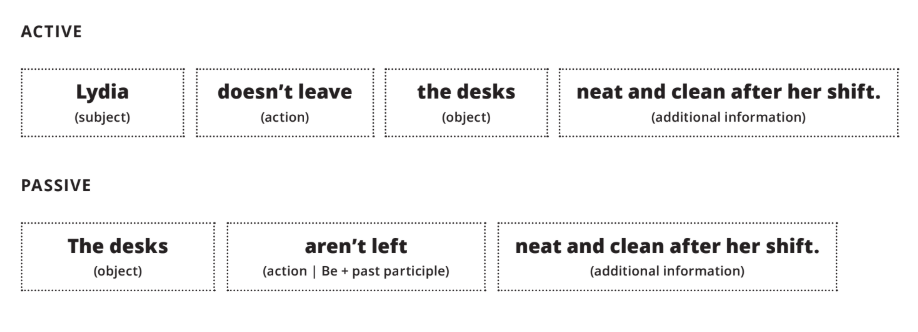Resolving Work Conflicts
In this lesson, you will learn useful vocabulary and expressions that you can use in resolving work conflicts. The more you practice, the more comfortable you will feel on the resolving skills!

Part 1
Warm-Up
Work with your teacher. Discuss the questions.
What are some common conflicts that occur in the workplace?
When was the last time you dealt with a workplace conflict?
Describe what happened.
Read the scenario.
Complete the phrases with your own ideas. Then compare your ideas with a partner.
• I think a good way to approach this situation would be…
• In this situation, I probably wouldn’t…
You are an office manager. Your office has a hot-desking* policy. You have received numerous complaints about one of your employees. Other staff members say that this employee never leaves the work spaces clean. They are always finding food wrappers and crumbs around the desks, and the keyboards are sticky. You’ve noticed this yourself, and it’s time to do something about this problem. How would you approach the situation?
*Note:
Hot-desking is a workplace practice in which multiple employees use the same work space at different times of the
day. Using this rotating system, employees often sit at different desks each day.
Work in pairs. Role-play a conversation between the office manager and the employee who’s causing problems from Part A. Take turns acting out each role.
Part 2
Vocabulary Preview
Match the words or phrases with their correct meaning.
shift ___
to no longer allow
crumb ___
a very small piece of food
point the finger ___
to make something seem more important than it actually is
plug away at (something) ___
to continue doing a task, especially one that is difficult or boring
frankly ___
dirty
the state of (something) ___
to speak about someone in a different way from others, either to praise or to criticize
single (someone) out ___
the hours that one works
grubby ___
the condition something is in at a given time
ban ___
honestly, truthfully
make a big deal out of (something) ___
to blame or accuse
Part 3
Listening
Listen to the two conversations between an office manager and her employee. Answer the question.
Was the manager’s approach better in Conversation 1 or
Conversation 2? Why?
Listen to each conversation again. Create a short list of dos and don’ts for dealing with conflict, based on what you hear. An example of each has been given.
| Do | Don’t |
| Begin the conversation with small talk. | Don’t bring up the problem or issue immediately. |
Part 4
Language Functions
Read the transcript of Conversation 1 and answer the questions.
What general questions does Olivia ask to initiate small talk?
_____________________________________________________
What phrase does Olivia use to move the conversation toward the problem?_____________________________________________________
What phrase does Olivia use to make the problem seem less serious?
_____________________________________________________
What does Olivia say to be less direct and to make sure the employee doesn’t feel singled out?
_____________________________________________________
How does Olivia close the conversation in a positive way?
_____________________________________________________
Read these extracts from Conversation 1. Answer the questions.
Extract A: We’ve had a few comments about food being left around.
Does Olivia say who has made the comments?
_____________________________________________________
Does Olivia mention who is leaving food around?_____________________________________________________
How might Lydia have reacted if Olivia had said the following:
“People have complained that you leave food around”?
_____________________________________________________
Extract B: The desks aren’t always left neat and clean after a shift.
Does Olivia make it clear who is leaving the desks in a messy state?
_____________________________________________________
Does Olivia suggest that this happens every shift?_____________________________________________________
Part 5
Grammar Review
PASSIVE VOICE
We often use the passive voice when we want to emphasize the action over the person doing the action. The passive voice creates a sense of emotional distance and anonymity, which is especially important if you want to avoid blaming someone for a “wrong” action.
To change an active sentence to the passive, follow these steps:
• Make the recipient of the action the subject.
• Use the Be verb plus a past participle.

Change the sentences from active to passive. Avoid mentioning who does the action.
| Active form | Passive form |
| Roberto doesn’t always turn off the office lights when he leaves the building at the end of the day. | The office lights aren’t always turned off at the end of the day. |
| Most employees don’t display their staff parking permits in the front window of their car. | |
| Sarah and Eliza take too many smoking breaks. | |
| Everyone on the evening shift submits their monthly expense claims late. |
Part 6
Role-play
Work with your teacher. Act out the following converstations. In each case, managers should try to follow these steps:
– Initiate the conversation with small talk.
– Steer the conversation gently toward the problem.
– Avoid direct blame – use the passive voice when possible.
– Address the issue in a polite and calm way throughout
– End the conversation in a positive manner.
SCENARIO 1
Student A: General Manager (Name: Alicia)
You’ve received feedback from a few supervisors that certain staff members take too many breaks. Smokers are allowed one break in the morning and one in the afternoon. However, some staff members who smoke are seen quite regularly in the smoking area of the parking lot. You don’t mind employees taking a break and even having a chat within reason.
You need to approach Colin about this issue.
You don’t have the best working relationship with
Colin. He can be difficult to deal with.
Student B: Employee (Name: Colin)
You’re a smoker. You take regular smoking breaks at work. You go to the smoking area two or three times in the morning and at least twice every afternoon. It’s a good place to catch up with your coworkers. You meet one of your colleagues there during most breaks and gossip about the managers, especially about your boss, Alicia. She always seems to single you out when
there are issues at work.
It’s not easy having an addiction. You feel like smokers should get more breaks throughout the day.
SCENARIO 2
Student A: Sales Manager (Name: Patrick).
You are the sales manager of the company. One of the team supervisors, Isabel, oversees a small but successful team of sales reps.
Isabel’s approach to supervision seems to work well. However, it goes against company policy. All staff should be on-site from 9 am to 5 pm. Isabel runs her team as if there were flextime, like in her previous job. You haven’t mentioned this before as it seems to work. However, there has been feedback from other supervisors that their employees feel this is unfair.
Why should Isabel’s team get special treatment?
Remind Isabel of company policy. Whatever you do, try to be as indirect as you can—Isabel is quick to get defensive.
Student B: Team Supervisor (Name: Isabel)
You supervise a small team of sales reps. Your team performs well, and you feel this is because of your relaxed approach. You don’t mind if your team members arrive later than 9 am or leave before 5 pm as long as they are reaching their targets.
Your team loves you for this, but it does go against company policy. Still, a flextime approach worked well at your last job, and no one has complained about it so far. If they do complain, you’ll just show them the sales figures. Your team outperforms everyone else, so what’s the problem?
1. How easy/difficult was it to deal with each issue?
2. How well did you follow the steps as a manager? Which step did you find the hardest?
3. What language and techniques from this lesson could you take forward into your own work?
4. Is it always best to be indirect and avoid blame when dealing with workplace conflict? Why or why not?
Part 7
Transcripts
Transcripts for Conversation 1.
Olivia: Morning, Lydia.
Lydia: Hi, Olivia.
Olivia: How are you doing?
Lydia: Pretty good, thanks.
Olivia: How’s that data entry task going? It’s a big one!
Lydia: We’re getting there, I think.
Olivia: Great. Listen, Lydia, can I have a quick word with you?
Lydia: Sure, what’s up?
Olivia: It’s nothing major. It’s just about hot-desking.
Lydia: Okay.
Olivia: As you know, we share our desk space with the evening staff, and everyone is moving around all the time and…
Lydia: Yeah…
Olivia: So, a few of the other employees have mentioned that the desks aren’t always left neat and clean after a shift.
Lydia: Tell me about it!
Olivia: Hmmm. Well, we’ve had a few comments about food being left around. Wrappers and crumbs mainly.
Lydia: Well, it’s not me.
Olivia: I’m not pointing the finger at you. It’s fine to have snacks at your desk—whatever keeps you going! Can you just make sure you leave your desk space neat and clean for others? I’ve said the same to most of the team. I’m not saying it’s anyone in particular.
Lydia: Sure, alright.
Olivia: Thanks. Anyway, keep plugging away at that data entry. How long do you think it’ll take?
Lydia: Oh, I think we’ll have it done by the end of the week.
Olivia: Great to hear! I’ll let you get back to work.
Lydia: Thanks.
Transcripts for Conversation 2.
Lydia: Hi, Olivia.
Olivia: Hi, Lydia. We need to talk about your cleanliness.
Lydia: I’m sorry?
Olivia: I’ve noticed that you’re snacking a lot at your desk. Potato chips, chocolate bars…
Lydia: Oh, right. I need the energy! Olivia: Yeah, I get that. But everyone’s complaining about the state of your desk. There are
crumbs everywhere. The keyboard is sticky. You don’t leave it in a nice state for others to use. You know we have a hot-desking policy. Can you show some consideration for others?
Lydia: Wait a second. I’m not the only one that snacks at my desk. Why are you singling me out?
I’ve seen Henry eating sandwiches and leaving crumbs everywhere too. It’s not just me. I don’t think it’s fair that you’re pointing the finger…
Olivia: I’ve had complaints from various members of the evening staff as well as colleagues on
this shift too. They all mention how grubby the desks are after you’ve been at the work space. Look, if I can’t trust you to clean up after yourself, we’ll have to think about banning snacks. Frankly, I don’t think others would appreciate that.
Lydia: That’s ridiculous. Seriously, I feel like you’re making a really big deal out of this.
Olivia: Well, it’s clearly more of an issue than you think.
